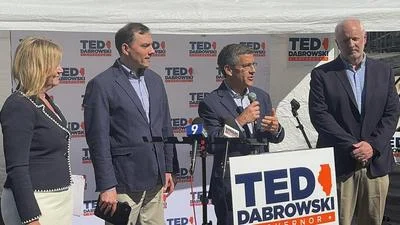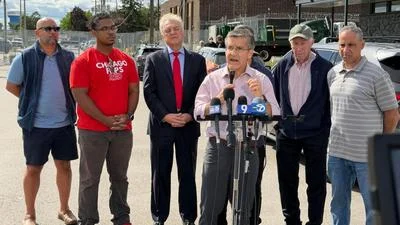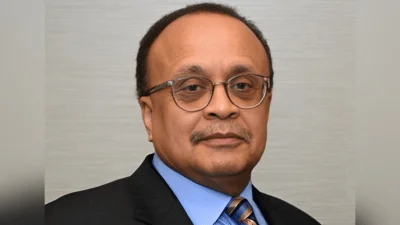Illinois State Board of Education Finance and Audit Committee met May 2.
Here are the minutes provided by the committee:
I. Roll Call
Chair Chris Benson brought the meeting to order at 9:35 a.m. Roll call was taken, and a quorum was present with two members. Chair Benson and Roger Eddy were both physically present.
Members Present
Chair Chris Benson
Roger Eddy
Members Absent
Dr. James Anderson
Other Board Members Present
Dr. Steven Isoye, Chair of the Board
Staff
Dr. Tony Sanders, State Superintendent
Kim Clarke, Executive Assistant to the State Superintendent
Jo Ireland, Board Services Coordinator
Dr. Jennifer Kirmes, Executive Director of Teaching and Learning
Dr. Matt Seaton, Finance Officer
Michael Gum, Director of School Business Services
Dr. Christine Paxson, Director of ESSA/IL-EMPOWER
Kim Barnes-Cummins, Director of Wellness
Tassi Maton, Internal Audit Officer
Krish Mohip, Deputy Operational Education Officer
II. Public Participation
Ken Wallace, superintendent of Maine Township School District 207, spoke on Career and Technical Education (CTE) funding. He said that a high number of high-paying jobs were available without a college degree, but that current career preparation tracks were not best aligned to meet these needs. He advocated for an increase in CTE funding and for formula reform in future years.
Earl Flack, president of McKay NAPA Auto Parts, spoke on CTE funding. He discussed a national worker shortage and said that a greater investment in CTE would allow students greater access to jobs after graduation. He advocated for increased investment in CTE funding, particularly on the high school level.
III. Approval of Minutes: April 4, 2023
Mr. Eddy moved that the Finance and Audit Committee approve the April 4, 2023, meeting minutes. Chair Benson seconded the motion, and it passed by a unanimous roll call vote.
IV. Presentation/Discussion
A. State CTE Funding Formula Update
Dr. Kirmes provided information on current work to update the state CTE funding formula.
Dr. Kirmes provided an overview of the funding sources. She noted that 40% of the $48.6 million in federal funding went to the Illinois Community College Board for postsecondary career education opportunities. The remaining 60% went to ISBE, with 85% of that allocated for formula distribution. She provided a breakdown of approximately $43 million in state funding. Formula grants and Area Career Centers (ACCs) receive a majority of state funds, and Dr. Kirmes said that these areas were the focus of current formula work.
Dr. Kirmes said that 19% of state funding goes to ACC funding, and that ISBE staff was strongly considering incorporating a formula funding methodology based on student enrollment. She noted that stakeholders were interested in support for capital needs of ACCs and said that there is a need to further explore ways to provide this support.
Mr. Eddy asked about the current formula for ACCs. Dr. Kirmes said that they received level funding based on a previous formula with complexities that resulted in inequity between ACCs, which led to a focus on student enrollment. She said that when new ACCs are added, increased funds will be needed to prevent funding loss in existing ACCs. Chair Benson thanked staff for considering these factors. Dr. Kirmes said that the timeline for establishing a new ACC would provide enough time for the Board to account for it in its annual budget recommendation.
Mr. Eddy asked about the impact of increased CTE enrollment, which would lower the amount of funding per student. Dr. Kirmes noted that ACCs are also significantly supported by districts and could work with them to make decisions on programmatic allocations in a given year.
Chair Benson said ACCs were important for smaller districts that would not be able to provide the same standard of CTE programming alone and that navigating their capital needs was important. Dr. Kirmes said that ACCs were eligible under the School Construction Grant Program, but received low priority, and could not use taxation to raise funds as districts did. She emphasized that conversation on ACC capital needs was needed outside of current formula work. Mr. Eddy highlighted the growing presence of electric vehicles as an area where support for program transition would be needed, and that funds to support purchases would be too great to come out of annual CTE funding.
Dr. Sanders discussed the potential use of Evidence-Based Funding (EBF) to support those program transitions. Mr. Eddy said work is still needed to reach funding adequacy, and that districts would be competing with other needs if they used it to support CTE. Chair Benson said that in addition to formula work, considerations to support other capital needs are necessary. Dr. Kirmes noted that a certain portion of federal funds could be reserved to support new or updated programs and that increases in federal funds meant that this could be done without impacting current funding levels.
Dr. Kirmes said that staff is looking at a model for formula grants that would have different categories for elementary, secondary, and leadership program funding. She said that the $1 per student guideline for elementary funding would likely remain the same, but that staff was looking at ways to enhance equitability of funding, citing EBF or Perkins methodology as potential models.
Dr. Sanders asked about using EBF funding adequacy levels instead of tier designations, noting that tiers would ideally be obsolete in the long term. Dr. Kirmes said that staff has noted this and would consider it in modeling work. Mr. Eddy said that the EBF model might be more equitable to consider than Perkins federal funding, since it has a more thorough consideration of school needs than just low-income designations in Perkins. For secondary funding, Dr. Kirmes said that staff wanted to consider weights based on both CTE participants and concentrators, who have taken multiple courses in a single CTE program, and from a multiplier related to EBF tiers or adequacy. She said that the general goal was to ensure that districts with greater needs would receive a higher share of supporting resources.
Dr. Sanders asked to confirm that weights would take into account holding harmless per-student funds in schools with greater funding adequacy and if the example values provided were a starting point for modeling. Dr. Kirmes confirmed both of these were the case, and that staff would be testing adjustments to determine which models might best meet overall needs.
Chair Benson discussed the uncertainty of how programs and participation might change over time and that consideration of these changes would be an important part of any model. Dr. Kirmes agreed and noted that assessments of more localized program and labor needs were conducted as the Perkins model was developed.
Mr. Eddy noted that any transition to a new formula would require increased funding to hold harmless.
Dr. Kirmes said that the current system had fixed amounts for leadership funding. She said staff was looking at principals’ salaries on the regional level as a basis for considering full-time system director salaries, with a prorated system if only part time. She also noted a share that could be used for other administrative costs.
Mr. Eddy asked if the leadership funding was currently determined federally, and Dr. Kirmes said that it was a part of the state formula grants. Mr. Eddy asked if the current share of formula funding was sufficient to meet the proposed goals for leadership funding. Dr. Kirmes said she could follow up with calculations of expected costs, but that it would necessitate an increase. She noted that federal funding designated for leadership is for ISBE to administer the CTE system.
Mr. Eddy asked if the intention of state funding for leadership was to increase the number of directors working in CTE programs. Dr. Kirmes confirmed this and noted the consideration of equity, since evidence suggested that full time directors had enabled better program outcomes. Mr. Eddy asked about funding if regions did not opt for a full time director, and Dr. Kirmes said they would receive the prorated option.
Dr. Kirmes discussed potential options for a transition period, citing either a two- or three-year transition starting in fiscal year 2025. She noted that a similar approach had worked well for programs with state universities, though with lower levels of funding.
Mr. Eddy asked about the needed increase in funds to support the transition. Dr. Kirmes said that a particular share of the total funding amount would be distributed by a new model and the rest would be used at level funding. Mr. Eddy said that whatever associated costs should be from increased funding and not take away from other programs in the education budget.
Dr. Kirmes discussed the next steps, saying that she would provide examples of potential models with prospective dollar amounts at upcoming meetings. She said that once models were more finalized, staff could test the impact of potential increases to funding.
Chair Benson thanked Dr. Kirmes for the presentation and staff for their work on the formula. Dr. Kirmes thanked Director of CTE and Innovation Marci Johnson for her dedication to the issue.
Mr. Eddy emphasized the need for additional funding to meet programming needs, even with an improved model. Dr. Isoye said that once a new formula had been finalized, the exact increase to funding would be easier to determine. He also noted capital needs of programs, and the general trend of growth in these programs across the field. Chair Benson said that changes were to be expected. Mr. Eddy pointed to the impact of the school construction program, and the need for a separate consideration for CTE capital needs.
V. Closed Session (as needed)
Chair Benson said that a closed session was not needed at this meeting.
VI. Review of Rulemaking – for May Approval
A. Approval for Adoption – Part 151 (School Construction Program)
Dr. Seaton and Mr. Gum discussed this item, saying that there had been no public comment on the changes.
Mr. Eddy said that intended changes to the program could not come without sufficient funding, but that the rules were well thought out.
VII. Review of Contracts and Grants Over $1 Million – for May Approval
Chair Benson noted that items for May approval had been discussed thoroughly at the previous meeting.
A. Contracts & Grants Over $1 Million – Approval of Intergovernmental Agreement with ROE 9 to Administer Learning Technology Center
There were no questions.
B. Contracts & Grants Over $1 Million – Approval of Member Initiative Grant to Virtual Learning Systems
There were no questions.
C. Contracts & Grants Over $1 Million – Approval of Intergovernmental Agreement with Illinois Department of Human Services Division of Mental Health for the Execution of a Project AWARE 2.0 Grant
There were no questions.
D. Contracts & Grants Over $1 Million – Approval of Intergovernmental Agreement with ROE 40 for the Execution of a Project AWARE 2.0 Grant
There were no questions.
E. Contracts & Grants Over $1 Million – Approval of Intergovernmental Agreement with West 40 for the Execution of a Project AWARE 2.0 Grant
There were no questions.
F. Contracts & Grants Over $1 Million – Approval of Intergovernmental Agreement with Southern Illinois University for Execution of a Mental Health Services Provider Grant
There were no questions.
G. Contracts & Grants Over $1 Million – Approval of Intergovernmental Agreement with University of Illinois Springfield
There were no questions.
H. Contracts & Grants Over $1 Million – Approval of Intergovernmental Agreement with Illinois State University Center for Intensive Behavioral Supports for Execution of the RTO Training and Supports Program
There were no questions.
I. Contracts & Grants Over $1 Million – Approval of Intergovernmental Agreement with the National Board Resource Center at Illinois State University to Administer the National Board for Professional Teaching Standards Program
There were no questions.
J. Contracts & Grants Over $1 Million – Approval of Sole Source Contract with Illinois Education Association to Administer the Virtual Coaching and Mentoring Program
There were no questions.
K. Contracts & Grants Over $1 Million – Discussion and Approval of Contract Award for Facilitation of the State's Accountability Technical Advisory Committee
There were no questions.
L. Contracts & Grants Over $1 Million – Approval of the Release and Award of the Request for Sealed Proposals for Student Information Systems Contractual Team
There were no questions.
VIII. Review of Contracts and Grants Over $1 Million – for June Approval
A. Contracts & Grants Over $1 Million – Approval of FY 2024 Continuation School Improvement Grants Dr. Paxson discussed this item.
Mr. Eddy asked to confirm that allocations were made to school districts that had a choice of ISBE-approved providers in the program, and Dr. Paxson confirmed this was the case. Mr. Eddy asked about the array of providers, including how many were out of state, and previous school choices. Dr. Paxson said staff could follow up with more detailed information, but that providers would be able to work across the entire state.
Mr. Eddy asked about the allocation amount of $53 million. Dr. Paxson said that districts did not have to use all of their allocated funds for the providers and that the program was to help support district leaders in developing administrative decision making and sustainability beyond the external support. Mr. Eddy noted that it was a high amount of funding and expressed an interest in tracking its usage and outcomes. Chair Benson agreed.
Dr. Sanders said that a lot of feedback in his outreach across the state was focused on state systems of support and that he would look to work with the Board to consider improvements.
B. Contracts & Grants Over $1 Million – Approval of Intergovernmental Agreement with ROE 40 for the Execution of a School-Based Mental Health Services Grant
Ms. Barnes-Cummins discussed this item.
Mr. Eddy asked about the geographic reach of the program and details on program offerings. Ms. Barnes-Cummins said that she could follow up with more information, but that program staff would likely travel to different schools in addition to virtual components.
IX. Internal Audit Updates
A. Current Audits
i. Acceptance Item – Fiscal Year 2022 Financial Audit Report
Ms. Maton said that the report was released on April 18, 2023, and that there were three materials findings.
ii. Acceptance Item - Compliance Examination Report for the Two Years Ended June 30, 2022 (as needed) Ms. Maton said that ISBE had received a draft report, and responses to report findings were due May 15, 2023. She expected it would be on the agenda for Board approval at the June 21, 2023, meeting.
iii. FY 2022 Statewide Single Audit
Ms. Maton said that finalization of this audit was still pending.
X. New Business: Items for the Next Agenda
Mr. Eddy asked for an update on 21st Century Community Learning Centers (21st CCLC) funding concerns. Dr. Sanders said that staff had been working to connect with school districts about potential program offerings.
Mr. Mohip said that superintendents in 46 out of 68 affected districts so far had expressed interest in providing programs, and that this could reach most of the students affected by program disruptions. He said that ISBE had been making districts aware of different funding opportunities to support these programs, and ISBE staff were available to discuss potential options. He noted that some districts had anticipated taking on funding responsibilities for these programs, but that short notice had presented issues in pursuing grants to support these programs.
Mr. Eddy asked about where funding would be going. Dr. Sanders said it varied between districts’ decisions, with some working directly with 21st CCLC organizations and others opting to take on provision of services directly. Dr. Sanders said that the U.S. Department of Education had permitted the use of American Rescue Plan money to cover the overcommitted funding for current grants. He also said that if the General Assembly intervened, a one year extension would not conflict with the federal regulations, with the possibility of extensions in future years yet to be determined.
Mr. Eddy noted that there was still a funding cliff. Dr. Sanders said that FY 2019 grantees might have expected a new grant cycle based on previous years, but that ISBE has not made any commitments, though greater communication should have occurred. Mr. Mohip said that there had been more communication about the end of funding with FY 2015 grantees.
XI. Next Meeting: June 6, 2023
XII. Adjourn
Mr. Eddy moved to adjourn. Chair Benson seconded the motion, and it passed by a unanimous roll call vote. Chair Benson adjourned the committee at 11:11 a.m.
https://www.isbe.net/Documents_Board_Meetings/20230502-FA-Minutes.pdf





 Alerts Sign-up
Alerts Sign-up